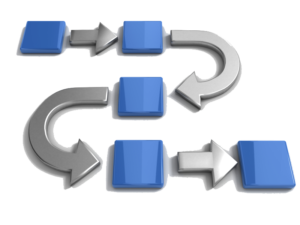The Processes That Run Our Life
 We all know that we all experience the world through a combination of our mind and our senses.
We all know that we all experience the world through a combination of our mind and our senses.
But we all process these stimuli differently. This difference is called our ‘subjective’ reality, versus the ‘objective’ reality that just ‘is’.
Another way of putting it is you have ‘reality’ (the outside world) and you have your ‘internal map of reality’ (the inside world).
Furthermore, our internal map of reality can also be called a ‘Paradigm’.
There are a (large) number of 5 step processes (called ‘strategies’) that govern our life, and a typical one happens something like this:
 1. Say we are in a ‘haunted house’ and we hear a creaking door. We get input from the environment – our 5 senses, sight, taste, touch, smell and hearing (creaking door: auditory).
1. Say we are in a ‘haunted house’ and we hear a creaking door. We get input from the environment – our 5 senses, sight, taste, touch, smell and hearing (creaking door: auditory).
2. Because there is a huge amount of data in our environment, this data needs to be filtered:
- we delete things,
- we distort things,
- we generalize about things according to our internal map of reality.
(‘all creaking doors are caused by ghosts’).
For instance, I see a door: I generalize and call it a door because it looks like a lot of other doors I have seen. Now our filters can be useful: because I know it is a door, I can use my ‘open door and walk through’ strategy.
But filters can be useless as well: if I didn’t believe in doors, I might use the deletion filter and try to walk through without opening it (ouch!)
Or if I believed that doors came in only one size, I might distort the size of the door and get stuck in it (ouch #2!)
3. After filtering, we create what is called an ‘internal representation’. In the case of the door, it is largely visual because we saw the door. However if we heard the creaking, we might make a ‘auditory’ internal representation. (‘creaking door means It must be a ghost?’)
4. We experience an emotional state (fear)
 5. We behave according to a pre-programmed routine (running away)
5. We behave according to a pre-programmed routine (running away)
As I said above, your ‘paradigm’ is a general way of referring to your internal map of reality.
If you have a paradigm shift, it is because new information forces you to alter this paradigm. If you recently learned that ‘there are no such things as ghosts’ then you would probably act quite differently as a result of this new information.
The Law of Attraction is a function of your map of reality. Your map of reality will filter things out for you so you will always see what your mind wants to see.
If you want a new car, your mind will give you examples from the real world that satisfy your desire.
Conversely if you focus on what you don’t want, your mind will do likewise and keep showing you things you don’t want. Your behavior and experiences will be as a result of your paradigm.
The key to this is then: always focus on what you want – not on what you don’t want!
